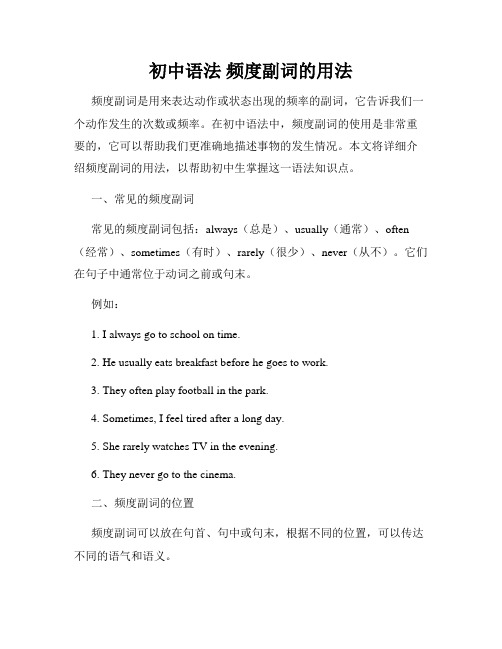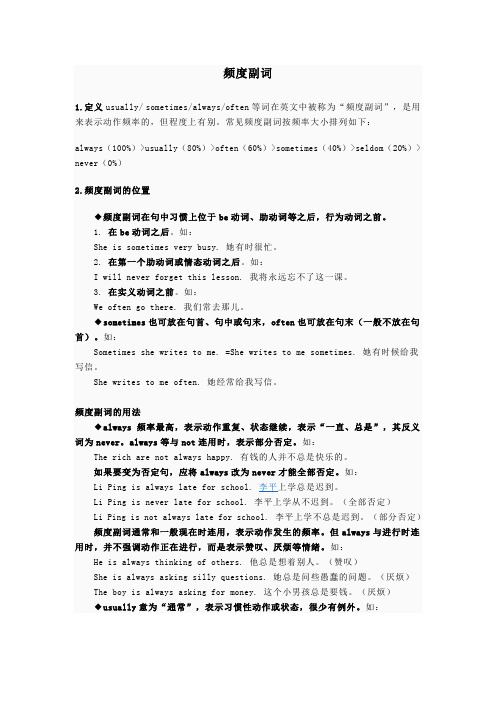频度副词always
初中语法 频度副词的用法

初中语法频度副词的用法频度副词是用来表达动作或状态出现的频率的副词,它告诉我们一个动作发生的次数或频率。
在初中语法中,频度副词的使用是非常重要的,它可以帮助我们更准确地描述事物的发生情况。
本文将详细介绍频度副词的用法,以帮助初中生掌握这一语法知识点。
一、常见的频度副词常见的频度副词包括:always(总是)、usually(通常)、often (经常)、sometimes(有时)、rarely(很少)、never(从不)。
它们在句子中通常位于动词之前或句末。
例如:1. I always go to school on time.2. He usually eats breakfast before he goes to work.3. They often play football in the park.4. Sometimes, I feel tired after a long day.5. She rarely watches TV in the evening.6. They never go to the cinema.二、频度副词的位置频度副词可以放在句首、句中或句末,根据不同的位置,可以传达不同的语气和语义。
1. 句首位置:当频度副词放在句首时,强调的是频度副词本身。
例如:Always, he gets up early in the morning.Usually, she goes to bed at 10 p.m.2. 句中位置:当频度副词放在句中时,通常位于be动词或助动词之后,或者在情态动词之前。
例如:I am always happy to see you.She can usually solve the math problems.They have often traveled to different countries.3. 句末位置:当频度副词放在句末时,强调的是动作本身。
频率副词类的英语单词

频率副词类的英语单词1. Always(总是)2. Never(从不)3. Often(经常)4. Rarely(很少)5. Sometimes(有时候)6. Frequently(频繁地)7. Regularly(定期地)8. Occasionally(偶尔)9. Seldom(很少)10. Generally(通常)11. Daily(每日)12. Weekly(每周)13. Monthly(每月)14. Yearly(每年)15. Hourly(每小时)频率副词类的英语单词,来300个1. Always(总是)2. Never(从不)3. Often(经常)4. Rarely(很少)5. Sometimes(有时候)6. Frequently(频繁地)7. Regularly(定期地)8. Occasionally(偶尔)9. Seldom(很少)10. Generally(通常)11. Daily(每日)12. Weekly(每周)13. Monthly(每月)14. Yearly(每年)15. Hourly(每小时)16. Annually(每年一次)17. Continuously(不断地)18. Usually(通常)19. Infrequently(不经常地)20. Occasionally(偶尔)21. Consistently(一贯地)22. Once(一次)23. Twice(两次)24. Three times(三次)25. Rarely(很少)26. Hardly ever(几乎从不)27. Every other week(每两周一次)28. Every three months(每三个月一次)29. Every day(每天)30. Every night(每晚)31. Every week(每周)32. Every month(每月)33. Every year(每年)34. Every few days(每隔几天)35. Every other day(每隔一天)36. Every other month(每隔一月)37. Every Tuesday(每周二)38. Every Thursday(每周四)39. Every Saturday(每周六)40. Every other Saturday(每隔一个星期六)41. On weekdays(工作日)42. On weekends(周末)43. Once in a while(偶尔)44. At times(有时候)45. From time to time(偶尔)46. Off and on(断断续续)47. Sporadically(零星地)48. Infrequently(不经常)49. Once or twice a week(一周一两次)50. A few times a year(一年几次)51. Very often(非常经常)52. Uncommonly(不常见)53. Seldomly(很少)54. Never again(再也不)55. Sometimes soon(很快有时)56. Not very often(不常)57. Just once(仅仅一次)58. At hourly intervals(每小时一次)59. Semiannually(半年一次)60. Semiweekly(每周两次)61. Quarter-hourly(每15分钟一次)62. Biennially(两年一次)63. In too large a percentage of cases(在太多的情况下)64. In many cases(在许多情况下)65. Infrequently(不经常)66. In rare cases(在极少数情况下)67. Infrequently(不经常)68. Intermittingly(断断续续)69. Irregularly(不规律地)70. More often than not(多半时候)71. Morning, noon and night(日日夜夜)72. Nightly(每晚)73. Now and then(偶尔)74. Occasionally(偶尔)75. Often enough(经常的)76. Quarter-hourly(每15分钟一次)77. Regular as clockwork(准时正点)78. Regularly timed(定时的)79. Repeatedly(反复地)80. Spasmodic(间歇性地)81. Sporadically(零星地)82. Sometimes(有时候)83. Sometimes sooner, sometimes later(有时更早,有时更迟)84. Sometimes this year(今年有时)85. Sporadically(不定期地)86. Three times a week(每周三次)87. Twice weekly(每周两次)88. Uncertainly(不确定地)89. Unevenly(不平均地)90. Unfrequently(不频繁地)91. Uninterruptedly(不断地)92. Usually, but not always(通常,但不总是)93. Very frequently(非常频繁)94. Weekly(每周)95. Yearly(每年)96. Intermittently(间歇地)97. The whole time(始终)98. The whole year round(全年)99. Less often than not(很少)100. Always and forever(永远)101. Hardly ever(几乎不)102. Annual(每年)103. Constantly(经常)104. Have to(必须,经常)105. Continuously(持续地)106. Every day but Sunday(除了星期天)107. Every night except Monday and Wednesday(除了星期一和三)108. Every other day(每隔一天)109. Every other week(每隔一周)110. Every other month(每隔一个月)111. Every other year(每隔一年)112. Invariably(无论何时都)113. Once a day(每天一次)114. Quite often(相当经常)115. Sporadically(有时)116. Weekly(每周)117. Frequently(时常)118. Intermittently(间歇地)119. Monthly(每月)120. Annually(每年一次)121. Never again(从不再来)122. Often enough(够经常)123. Hourly(每小时)124. Daily but Sunday(除星期天之外的每天)125. Every night but Thursday(除周四之外的每个晚上)126. Every other day(每隔一天)127. Every other week(每隔一周)128. Eevery other month(每隔一个月)129. Every other year(每隔一年)130. Hardly ever(几乎从不)131. Frequently but not always(经常但不总是)132. As much as possible(尽量)133. By and large(总的来说)134. Constantly(不断地)135. Daily(每天)136. Day by day(一天一天)137. Early and often(早早地经常地)138. Every blue moon(不经常)139. Every once in a while(偶尔)140. Every so often(有时)141. From time to time(时常)142. Habitually(习惯地)143. Infrequently(不经常)144. Irregularly(不规律地)145. Moment to moment(一刻不停)146. Most of the time(大部分时间)147. Nightly(夜间每天)148. Now and again(时时有)149. Now and then(有时候)150. Often (times)(经常)151. Occasionally(有时候)152. Once (a day, a week, an hour)(一次(每天,每周,每小时))153. Once in a blue moon(几乎不)154. Once or twice(一两次)155. Onetime(一次性的)156. Periodically(周期性地)157. Rarely ever(几乎从不)158. Regularly scheduled(定期的)159. Repeatedly(反复)160. Routinely(通常)161. Seldom(很少)162. Semi-frequently(有时)163. Sometimes(有时)164. Sometimes sooner, sometimes later(有时早有时晚)165. Sometimes this year(有时这一年)166. Sporadically(偶尔)167. Twice daily(每天两次)168. Twice a week(每周两次)169. Typically(一般来讲)170. Uncommonly(不常见)。
频度副词

频度副词usually, sometimes, always, often等词在英文中被称为“频度副词”,是用来表示动作频率的,但程度上有别。
一般说来可按频率大小排列:always>usually>often>sometimes>seldom(很少)>never(决不)一、频度副词的意义:1、always 意为“总是”,“一直”,它所表示的频度最高,相当于 all the time。
如:Tom is always late for school. 汤姆上学总迟到。
2、usually意为“通常”,在一般情况下做某事很少有例外的意思,倾向于一种习惯。
如:We usually go shopping on Sundays. 我们周日通常去购物。
3、often 意为“经常”,它表示的频度不及usually,用来表示动作重复,中间有间断。
如:We often have supper at home. 我们经常在家吃晚饭。
4、sometimes 意为“有时”,它所表示的频度在以上这几个词中最低,它可以放在句子中间,也可放在句首或句末。
如:She sometimes walks along the river. 她有时候沿着河边散步。
Sometimes I don’t like to work, because I feel too tired. 有时候我不想去工作,因为我感到太累了。
5、hardly ever 意为“几乎不”。
如:She hardly ever watches TV. 她几乎不怎么看电视。
6、never 所表示频度最低,它所表示的是否定意义,意为“根本不,从未”。
如:He has never been to Beijing. 他从未去过北京。
二、频度副词在句子中有不同的位置:A、动词be 之后:如“I’m usually ill on plane.”B、在实意动词之前:“I usually work on Friday.”C、在含有助动词的句子中,至于助动词之后,实意动词之前:“He doesn’t always work on Tuesday.”D:特殊用法:①sometimes可以放在句首、句中和句末②often 也可以放在句末例句: 1、I always get up at 7:00 o’c lock every morning. 我每天早晨总是在7点钟起床。
常用的英语频率副词

常用的英语频率副词常用的英语频率副词包括:always:表示“总是”,频率为100%。
usually:表示“通常”,频率为80%。
often:表示“经常”,频率为60-70%。
sometimes:表示“有时”,频率为20-40%。
seldom:表示“很少”,频率为20%。
hardly ever:表示“几乎不”,频率为5%。
never:表示“从不”,频率为0%。
这些频率副词在句子中的位置和使用方式:通常位于实义动词之前,动词be、助动词、情态动词之后。
例如:We often get together.(我们常常聚会)。
为了表示强调,频度副词有时也可位于动词be、助动词、情态动词之前。
例如:She always was late.(她老是迟到)。
在简略答语中,当频度副词与动词be、助动词或情态动词位于句末时,频度副词必须前置。
例如:“Philip is late again.”。
频度副词的常见用法和例句:always:表示动作重复、状态继续,如“The rich are not always happy. 有钱的人并不总是快乐的”。
often:表示反复性的动作或状态,如“It often rains here in April. 这儿四月份常下雨”。
sometimes:表示动作偶尔发生,如“Sometimes we go to the cinema and at other times we go for a walk. 有时我们去看电影,有时我们去散步”。
never:表示动作从未发生,如“Li Ping is never late for school. 李平上学从不迟到”。
频度副词

频度副词
1.概念
频度副词是用来表示动作发生频率的词,常用来表示不确定时间,主要包括always, usually, often, sometimes, hardly, ever, never等,如果表示具体频度次数,可采用次数加单位时间。
例如:
once a week 一周一次
twice a month 每月两次
2.常用频度副词的区别
(1)always 意为“总是,永远”,表示频度最高。
(2)usually意为“通常”,即很少有例外,多用于一般现在时。
(3)often意为“经常”,在频度上不如usually那么频繁。
(4)sometimes意为“有时,偶尔”。
(5)hardly ever 意为“几乎不,很少”,表示否定意义。
(6)never 意为“从来没有,绝不”,表示否定意义。
以上几个频度副词所表示的频度,从高到低为:
always→usually→often→sometimes→hardly ever→never
3.频度副词在句子中的位置
在句子中,频度副词常放在实意动词前面,be动词、情态动词和助动词后面。
例如:
He always helps others.他总是帮助别人。
4.对句子中频度副词进行提问,用“how often”。
例如:
He sometimes watches TV.(对划线部分提问)
How often does he watch TV?。
频度副词

频度副词1.定义usually/ sometimes/always/often等词在英文中被称为“频度副词”,是用来表示动作频率的,但程度上有别。
常见频度副词按频率大小排列如下:always(100%)>usually(80%)>often(60%)>sometimes(40%)>seldom(20%)> never(0%)2.频度副词的位置◆频度副词在句中习惯上位于be动词、助动词等之后,行为动词之前。
1. 在be动词之后。
如:She is sometimes very busy. 她有时很忙。
2. 在第一个助动词或情态动词之后。
如:I will never forget this lesson. 我将永远忘不了这一课。
3. 在实义动词之前。
如:We often go there. 我们常去那儿。
◆sometimes也可放在句首、句中或句末,often也可放在句末(一般不放在句首)。
如:Sometimes she writes to me. =She writes to me sometimes. 她有时候给我写信。
She writes to me often. 她经常给我写信。
频度副词的用法◆always 频率最高,表示动作重复、状态继续,表示“一直、总是”,其反义词为never。
always等与not连用时,表示部分否定。
如:The rich are not always happy. 有钱的人并不总是快乐的。
如果要变为否定句,应将always改为never才能全部否定。
如:Li Ping is always late for school. 李平上学总是迟到。
Li Ping is never late for school. 李平上学从不迟到。
(全部否定)Li Ping is not always late for school. 李平上学不总是迟到。
(部分否定)频度副词通常和一般现在时连用,表示动作发生的频率。
英语的五个频率副词

英语的五个频率副词
英语中常用的五个频率副词是:always(总是)、often(经常)、sometimes(有时候)、rarely(很少)、never(从不)。
1. Always(总是)指的是某件事情持续发生的频率非常高,几乎每次都发生。
例如,"She always arrives on time for class."(她上课总是准时到达。
)
2. Often(经常)表示某件事情发生的频率较高,但没有到达每次都发生的程度。
例如,"I often go to the gym after work."(我经常下班后去健身房。
)
3. Sometimes(有时候)表示某件事情发生的频率中等,偶尔会发生但并不经常。
例如,"Sometimes I like to stay home and relax."(有时候我喜欢呆在家里放松一下。
)
4. Rarely(很少)表示某件事情发生的频率非常低,几乎不会发生。
例如,"I rarely eat fast food."(我很少吃快餐。
)
5. Never(从不)表示某件事情根本不会发生,完全没有发生的可能性。
例如,"I never forget my best friend's birthday."(我从来不会忘记
我最好朋友的生日。
)
这些频率副词在描述我们日常生活中某件事情发生的频率时非常有用,帮助我们准确表达事件发生的频率。
频度副词

频度副词1.频度副词:表示动作发生间隔(既频率)的副词。
它们有:always ; usually ; often ; sometimes ; seldom ; hardly ever ; never 等。
2. how often意为“多久一次”,用来提问在某一段时间内进行某个动作的频率。
其回答通常是often、sometimes、never、hardly ever、always、once a day、once a week等等表示频率的副词或是短语。
例: --- She hardly ever watches TV. (划线提问)--- How often does she watch TV?例句理解:1. —What do you usually do on weekends?—I often go to the movies.2. —How often do you shop?—I shop once a week.3. — How often does she exercise?—She exercises every day.3.频度副词:表示频率不确定频率短语表示频率确定(1)不确定的频度副词always(100%)> usually(约80%~90%)> often(约60%)> sometimes(约30%)> seldom(约20%)> hardly ever(约10%)> never(0%)(2)表示确定的频率短语every day/week/month/year 每天/周/月/年 once a week 每周一次twice a week 每周两次 twice a month 一月两次three times a day 一天三次注:三次或三次以上一般用“基数词+times”表示。
(3)在句中位置:频度副词在句中通常放在be动词、助动词、情态动词之后,在实义动词之前。
例:She is often late for school.I can never be sure.He always helps me.课堂巩固练习:一、对划线部分提问1)He always plays basketball after school._______ does he always _______ after school?2) They hardly ever play football._______ _________ ________ they play football?二、单项选择( ) 1. ---How often ______ she exercise? ---Twice a week.A. doB. doesC. doingD. did( ) 2. I ______ like to drink milk.A. notB. doesn’tC. don’tD. no( )3.---______do you go swimming ? ---Sometimes.A. How oftenB. How longC. how manyD. How old( )4. Katrina watches TV once ______ week.A. aB. theC. anD. ﹨知识扩展:1. how long多久(用来提问有多长时间)回答通常是more than two weeks、for a week、ten years等表示一段时间的状语。
- 1、下载文档前请自行甄别文档内容的完整性,平台不提供额外的编辑、内容补充、找答案等附加服务。
- 2、"仅部分预览"的文档,不可在线预览部分如存在完整性等问题,可反馈申请退款(可完整预览的文档不适用该条件!)。
- 3、如文档侵犯您的权益,请联系客服反馈,我们会尽快为您处理(人工客服工作时间:9:00-18:30)。
频度副词always频度副词always, usually, often, sometimes, hardly ever, never:频度副词词义频率英文释义近义词always 总是100﹪all the time constantlyusually 通常80﹪often, generally frequentlyoften 经常60﹪( at ) many times generallysometimes 有时40﹪at times, now and then occasionally几乎不20﹪almost not, not at all seldomhardlyevernever 从不0﹪not ever, not at any time rarely疑问词词义使用范围How long 多长时间;提问一段时间多长提问长度How far 多远提问距离How many 多少提问可数名词的数量How much 多少提问不可数名词的量、提问价钱或提问重量How often 多久一次提问表示频度副词或表示频度的短语How soon 多久以后提问表示将来时态的时间,多由in引出的一段时间短语部分省、市中考试题中有涉及How long、How far、How many、How much、How often、How soon 的句型转换试题(就划线部分提问)。
例1:At the age of five, Martin weighed 25 kilos.(上海市中考题)_____ _____ did Martin weigh at the age of five?析:How much。
划线部分涉及重量,应用How much提问,表示“多少”。
例2:She usually comes to see her grandpa four times a month. (呼和浩特市中考题)_____ _____ _____ she usually come to see her grandpa?析:How often does。
划线部分four times a month涉及频率,应用How often提问,同sometimes、usually、often、always、once、twice、once a week、twice a year等。
句中动词comes为单三式,改为疑为句时应添加助动词does,动词还原。
例3:Jim has stayed in China for five years. (哈尔滨市中考题)_____ _____ has Jim stayed in China?析:How long。
划线部分for five years涉及一段时间,而一段时间应用how long提问。
例4:The hospital is about 300 meters away. (甘肃省中考题)_____ _____ is the hospital?析:How far。
划线部分about 300 meters away涉及距离,应用How far提问。
例5:His uncle will be back in a week. (新疆乌鲁木齐市中考题)_____ _____ will his uncle be back?析:How soon。
划线部分in a week(一周以后)表示一段时间,常用于一般将来时态,而将来时态中的一段时间应用How soon(多久,多久以后)提问。
练习:1. John went to see his grandmother once a week. (2003广州市)______ ______ ______ John go to see his grandmother?2. He has worked in this school for five years. (2003四川省)______ ______ has he worked in this school?3.The meeting will start in ten minutes. (2003乌鲁木齐市)______ ______ will the meeting start?KEYS: 1. How often did 2. How long 3. How soon注意:在对划线部分提问的题型中,对动作提问要用疑问词What,后接疑问句,并应带有动词do,同时,do要依据原句中动词的形式而变化。
例1:He sometimes goes to the movies. — What does he sometimes do?例2:Ann often does her homework. — What does Ann often do?例3:I usually play football at school. — What do you usually do?例4:She is doing her homework. —What is she doing?◆But my mother wants me to drink it. 但我妈妈想我喝。
want somebody to do something 想某人做某事(用动词不定式做宾语补足语,类似的有wish、tell、like、would like、get、ask等。
)例:Would you like me to help her?◆She says it’s good for my health.她说那对我的健康有益。
be good for 对…有益—对比be good at(擅长于…);be good to (对…好)例:Watching TV too much is not good for your health.He is good at playing football.The old woman is good to us.◆And it makes a big difference to my grades.而且那对我的成绩造成极大的影响。
make a big difference to something 对…造成极大的影响例:Little sleep makes a big difference to my health.watch surf read go exercise sing play shop do skate1. Do you like ________ football?2. How often ________ she watch TV?3. I sometimes ________ the Internet.4. Millie usually ________ TV twice a week.5. I can ________ on the ice well.6. Would you like to go ________ ?7. I want to keep healthy, so I ________ every evening.8. Did you ________ the story?9. Why not ________ to the movies with me?10. Alice often ________ English songs in the forest.KEYS: 1. playing 2. does 3. surf 4. watches 5. skate 6. shopping 7. exercise 8. read 9. go 10. sings按要求改写句子,每空格限填一词。
(含缩写形式)1. Mrs Li taught her maths last year. (改为一般疑问句)_____ Mrs Li _____ her maths last year?2. Mike plays computer games every day. (改为一般疑问句)_____ Mike _____ computer games every day?3. My brother has lunch at the school every day. (改为一般疑问句)_____ your brother _____ lunch at the school every day?4. Ann returned the book to the library yesterday. (改为一般疑问句)______ Ann ______ the book to the library yesterday?5.We’ll have a class meeting this afternoon.(改为一般疑问句)______ you ______ a class meeting this afternoon?6. Lin Tao put the radil on the desk. (对划线部分提问)_____ _____ Lin Tao put the radio?7. He lost the key to his bike on his way to the lecture. (对划线部分提问)______ did he ______ on his way to the lecture?8. You’ d better not ask your teacher.(改为否定祈使句)_____ _____ your teacher, please.9. Uncle Wang likes making things.(改为否定句)Uncle Wang ______ ______making things.10.He has to buy a dictionary for his daughter. (改为否定句)He ______ ______ to buy a dictionary for his daughter.KEYS:1. Did ; teach 2. Does ; play 3. Does ; have 4. Did; return 5. will; have 6. Where did 7. What; lose 8. Don’ t ask 9.doesn’t like10. doesn’t; have翻译下列短语。
1、对…有益________________2、垃圾食品________________3、放学回家________________4、饮食习惯________________5、当然________________6、照顾________________7、使得结果大不相同________________ 8、拥有健康的生活方式________________9、与…相同________________ 10、有点不健康________________KEYS: 1. be good for 2. junk food 3. come home from school 4. eating habbits 5. of course6. look after7. make a big difference8. have a healthy lifestyle9. be the same as 10. be kind of unhealthy单词拼写。
